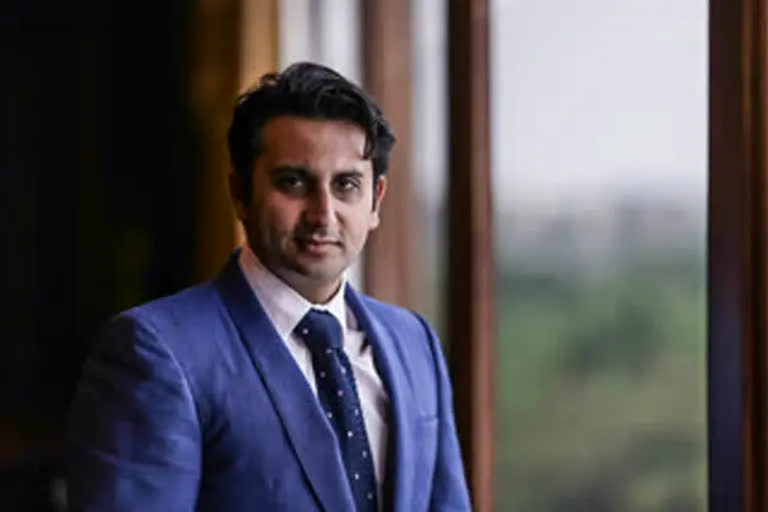New Delhi: Vaccine major Serum Institute of India (SII) has appealed to the government to reduce the gap between the second and booster dose to six months from nine months at present to safeguard people against emerging COVID variants, according to its CEO Adar Poonawalla. Recalling that they could not meet the commitment of exporting vaccines in the first quarter of 2021 due to "so much noise from public and the opposition", Poonawalla on Tuesday also pitched for a global pact for vaccine utilization. He noted that India and SII faced severe reputation damage when export of COVID vaccine was banned for nearly two months during the second COVID wave.
"The uptake (for precaution dose) right now is a bit slow as we have a rule that you have to wait for nine months between dose two and dose three. We have appealed to the government and the experts, who are having discussions regarding the matter, to reduce this period to six months," he said during an AIMA event here. Poonawalla noted that reducing the timeframe would give "real relief" to the people who want to travel abroad. If you have taken a dose in August then only you are eligible for a booster dose, so we need to reduce that gap to six months. Many citizens would be able to take the dose then," he said. He stated that all across the world, the gap between second dose and booster shot is six month or less.
When asked if the company is in discussions with the government on the issue, Poonawalla replied in the affirmative. "The experts and the government need to have their own discussions. We are just highlighting that this is the need that everyone has voiced from a practical standpoint from wanting to travel. So we have proposed a six month gap." Against this backdrop, he also pointed out that the world faces a choice between lockdowns and booster shots.
"It is so important to boost with whichever vaccines you can get your hands on, because that will ensure that you are protected and we reduce as a nation or even as states the chances of future lockdowns and disruptions... that's why I've been telling the government that please, for God's sake, reduce the gap from nine months to six months," Poonawalla said. Lauding the government for having brought in a booster policy, he said that SII has brought down the price of Covishield from Rs 600 per shot to Rs 225 as it wants to make it affordable and accessible for people. He advised all eligible people to take the shot in order to safeguard against future COVID variants which were emerging in different locations.
Poonawalla stated that the Pune-based vaccine major is giving compensation to private hospitals by way of three doses to adjust on the reduced prices. "So any hospitals that have old stock at Rs 600, they don't have to sell at a loss, we give them more vials so they don't go into a loss. We don't want them to lose money on old stock," he stated. Poonawalla said he is working on a global pandemic treaty, which espouses harmonisation of regulatory standards during a global pandemic situation, at the Davos summit next month.
Also read: Get boosted this Sunday at Rs 600 per shot: Poonawalla
"We need to address not only as a nation... We have to have in a pandemic situation global harmonisation of regulatory standards. We need to have mutual recognition of vaccine certifications. We need to have a free flow of goods of raw materials and vaccines in a crisis so that that sharing happens," he stated. According to him, with a global pandemic treaty, countries can always use their sovereign rights or whatever to abstain rather than relegate from it, but it would become much harder for political leaders to do that on a global stage.
"It would also make it much easier for politicians to convince their constituents in their own nations that this is the right thing to do and we've committed and signed up at a global level to do it," he noted. He noted that vaccine exports were hit during the second wave of COVID-19. "We were trying to export vaccines in the first quarter of 2021. The opposition, government and others felt that all the vaccines should remain in India. But what we failed to communicate to them perhaps as a community was that we get a lot of reciprocity from other countries because India is the pharmacy of the world," Poonawalla said.
He further said: "And our help and support to other nations gives us a lot of other things that I won't go into at the moment including the fact that when we needed oxygen, when we needed other things, other countries have stepped up and helped us because we supported them." The country should have continued giving some vaccines but there was so much noise from the public and the opposition that the government had no choice but to agree and keep all the vaccines for India, Poonawalla stated.
"That damaged the reputation of India and Indian companies abroad who had made commitments. So all these things are sometimes not easy to convey and articulate and, you know, with the media and the public at large in a crisis it is very difficult to manage that communication. And I hope that these are some of the learnings going forward," he added. Having a treaty would explain all this and give those commitments ahead of time, he said. He noted that at some point in time the Indian government helped the company to get raw materials from the US during the pandemic. "That was not necessarily in the sense that if we had a treaty and understanding in place at the country level, it would have been automatic. And that's what we need to get done," he added.
PTI



